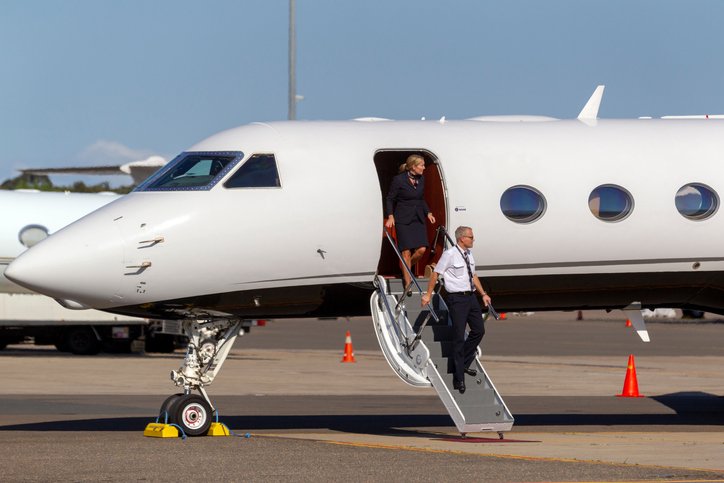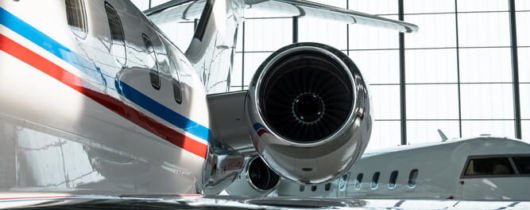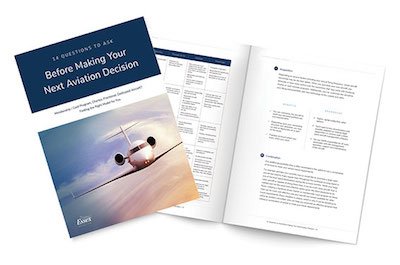
Businesses that own private aircraft (or, in some cases, a fleet of aircraft) find themselves faced with two options when deciding how best to manage their assets: Either hire a management company to take over operations or establish their own in-house flight department. Both come with unique advantages and disadvantages, so it’s important to carefully weigh all the travel, logistics, operational and management support requirements before deciding between the two. That said, it’s undeniable that an in-house flight department is an attractive option for organizations whose top priorities are privacy and more direct internal control over their aircraft operations and management.
In this article, we’ll explore everything that goes into forming a flight department, so that you can make the most informed decision whether it’s the right choice for your business.
What is a Flight Department?
A flight department is the people and processes responsible for the ongoing management, maintenance and aircraft operations on behalf of its owner. A flight department can vary from a single pilot to an entire facility with an organization staffed by a wide range of aviation experts. Though these examples stand at opposite ends of the spectrum, they are essentially the same in that they involve qualified professionals tasked with overseeing business aviation operations on behalf of the owner.
A flight department’s responsibilities include, but are not limited to:
- Trip analysis
- Flight planning
- Ongoing maintenance
- Overall operations
- Aircraft scheduling
- Flight planning
- Crew management
- Operational cost management
- Regulatory oversight and management
- And more
Flight Department vs. Management Company
As mentioned earlier, corporations that own private aircraft have their pick of either forming their own in-house flight department or working with a management company. Before you take any additional steps to research the option of establishing a flight department, it’s important that you understand the difference between the two, as well as the benefits and drawbacks to each.
Let’s start with the basics: Both flight departments and management companies are responsible for overseeing day-to-day activities involved in aircraft maintenance, management and operation. The only substantial difference between the two is that, with a flight department, the owner and their flight department assumes full responsibility for business aviation operations, whereas with a management company, a third-party entity assumes the responsibility.
Now, let’s take a look at the pros and cons for each.
Flight Department
| Pros | Cons |
|
|
Management Company
| Pros | Cons |
|
|
To be very clear, one is not preferable to the other. Nor is it an either/or proposition — a corporation can task its flight department with certain responsibilities and outsource others to a management company. The decision depends entirely on a business’ corporate culture, travel requirements, available in-house resources, where the aircraft is based and whether the company has a desire to start its own flight department and properly manage it on an ongoing basis. If you’re unsure which option to pursue, a business aviation consultant can help assess your needs and offer recommendations.
Things to Consider Before Forming a Flight Department
From a practical perspective, running an in-house flight department is not all that different from running a small business: Both require a significant investment to get off the ground, involve many roles and responsibilities and serve the primary purposes of increasing returns. To that end, a majority of aviation industry experts argue that a flight department should be managed like a business.
If you’re contemplating forming your own flight department, it’s important that you understand the various responsibilities you’ll need to take on, including:
- Expenses: An in-house flight department is not a revenue-generating organization. There are many expenses associated with managing and operating a flight department, including flight crew compensation and training, hangar rental fees, insurance payments, maintenance programs, fueling expenses and so on.
- Paperwork: When managing a flight department, it’s important that all paperwork and documentation be accurate and up to date; this includes maintenance and flight training manuals, operating handbooks, flight manifests, charts, maps, logbooks, tax documentation and so on.
- Flight Crew: If you intend to start your own in-house flight department, you’ll not only need to find but also thoroughly vet the qualifications and credentials of crew members, including pilots and maintenance personnel. We’ll cover key flight department roles in greater detail in the next section.
- Scheduling: There are a great many things that must factor into flight scheduling, including how often you intend to fly, how many people you need to transport, whether you intend to fly domestically or internationally and so on. Larger aircraft that fly internationally will generally need increased scheduling and operational support. Having a 24/7 operational capability can be an integral component to a successful trip.
- Hangaring: Depending on the size of your fleet and the needs of your organization, you’ll need to decide whether to rent hangar space or build your own. It’s also important to consider where your aircraft will be based because this will have a direct impact on your overall cost of fuel and whether you will require positioning flights on a regular basis.
- Maintenance and Repairs: You will need to put together a team of maintenance personnel to perform routine maintenance and provide administrative oversight on all documentation requirements.
- Laws and Regulations: In order to ensure total compliance and mitigate potential risk, it’s vital your flight department staff stay up to date on the latest industry regulations, as well as be informed about any laws related to domestic and/or international travel. It’s in your best interest to work with a business aviation attorney to understand the full scope of laws and regulations related to operating private business aircraft.
- Taxes: A great number of factors can come into play that can impact how business aircraft are or can be taxed, including the physical location of the aircraft at closing during an acquisition, the location of the hangar in which the aircraft is housed and where the aircraft regularly operates. Therefore, it’s important that you work closely with an aviation tax advisor and tax attorney to create a tax plan for your flight department.
- Safe Program: Depending on the size of your corporation and your flight department operation, it may make sense to develop your own risk management department and safety management system (SMS) program. Your safety program should cover everything from in-flight safety to ground crew safety and should utilize the latest technology to analyze flight data for additional safety recommendations.
- Plans for the Future: Many in-house flight departments start by managing a single aircraft and grow over time to a multi-aircraft operation. Before forming your own flight department, it’s important that you consider your long-term goals and objectives and any future plans you might have for your fleet.
Key Roles within a Flight Department
Every successful flight department needs a team of qualified professionals to support it. From purchasing fuel to training crew personnel to filing flight plans, your flight department will bear a great deal of responsibility, so it’s vital that you select the right people to get the job done.
At minimum, your flight department should include the following roles:
- Pilot: In addition to flying the aircraft, corporate pilots are also responsible for a wide variety of tasks, including filing flight plans, inspecting aircraft prior to takeoff, monitoring navigational systems, fuel loads and weather forecasts, writing and filing aircraft discrepancies and ensuring a pleasant in-flight experience.
- Flight Dispatcher: Your flight dispatcher is a crucial member of your operational team, tasked with designing flight plans, accounting for various operational and logistical items, including weather forecasts and safety guidelines, deciding whether to divert, delay or cancel flights, utilizing advanced systems for flight following, maintaining communication with pilots in the air and making other key operational decisions. Flight dispatchers must be FAA-certified and, along with the pilots, assume responsibility for the safety of every flight they dispatch.
- Maintenance Personnel: Maintenance personnel, including aircraft mechanics, avionics technicians and aircraft maintenance engineers, are responsible for performing or managing scheduled maintenance and inspections necessary to keep the aircraft in good operating condition.
- Aviation Safety Manager: As the title implies, an aviation safety manager is responsible for developing, implementing, monitoring and continuously improving an operator’s Safety Management System or SMS program. This typically involves managing reported safety issues, conducting risk analyses, staying current on the latest safety compliance policies and procedures, ensuring that all documentation is up to date and promoting general safety awareness.
- Aviation Department Manager: An aviation department manager oversees all operations of a flight department, including coordinating work assignments, ensuring Federal Aviation Regulation (FAR) compliance, reviewing aircraft incident reports and providing advisory services to governing agencies, when necessary. In the past, the role of aviation department manager was typically assigned to the most senior pilot within a corporate flight department. Although many aviation department managers still have a background in piloting, the position has become more sophisticated over time. As a result, a growing number of aviation department managers have backgrounds in areas of operation other than flying or have been specially trained or otherwise educated for the role of flight department manager.
How many employees you hire to fill these and other roles depends entirely on the size of your organization and your specific travel requirements. In smaller organizations, employees often wear multiple hats — for example, the aviation department manager might also be a pilot or might also fulfill safety manager duties. The most important thing is that each member of your flight department staff has the necessary qualifications to ensure that business aviation operations are safe and efficient. When hiring flight department personnel, be sure to work closely with your human resources department to guarantee compliance with federal and state employment regulations, as well as adherence to company-wide hiring standards.
What is the Flight Department Company Trap?
Though the term “flight department” is simple enough to understand, it takes on new meaning when adjoined with the word “company.” A flight department company — also known as a “single” or “sole purpose” company — refers to any entity founded for the sole purpose of managing and operating an aircraft. In other words, a flight department is a department within a corporation, whereas a flight department company is its own separate corporate entity.
This is an important distinction from a regulatory perspective. Although the FAA allows for sole purpose companies to own and operate aircraft, they are required to do so under the commercial charter rules outlined in Part 135 of FAR. The issue is that many flight department companies — whether knowingly or unknowingly — illegally operate their aircraft under the non-commercial flight rules of FAR Part 91.
FAR Part 135 has specific rules governing the carriage of persons, flight compensation, flight-duty times and rest requirements, equipment standards, pilot qualifications, aircraft certifications, and more. By comparison, FAR Part 91 is more lenient — for example, Part 91 does not require passenger identification for domestic flights within the United States or impose duty limitations. Additionally, Part 91 has a lower bar to entry than Part 135, which requires multiple certifications and all of the accompanying expenses.
It’s easy to see what makes Part 91 so appealing — and therein lies the risk of falling into the flight department company trap. Although flight department companies are typically established in order to shield corporations from liability, operating under Part 91 rather than Part 135 can actually open a corporation up to a whole new area of legal risk. To that end, there are options available to avoid the flight department company trap. One would be to operate under Part 135 and consider operating under a third-party management company’s certificate. There are various leasing or time share structures that can be utilized, though any organization that wishes to utilize any of these alternatives should consult a business aviation attorney and a business aviation consultant for professional guidance.
For more information on the flight department company trap and how to avoid it, the National Business Aviation Association is an excellent resource on the subject.
Conducting a Flight Department Review
For corporations that already have an in-house flight department, it’s best practice to conduct a review on a regular basis to determine whether the flight department is performing to the standards outlined in its operating manuals.
Typically, a business aviation consulting firm will perform the review and evaluate the following:
- The flight department or flight department company’s internal policies
- Compliance with FAA or other foreign aviation administration under which the aircraft operates
- Maintenance records
- Personnel training
- Personnel satisfaction
- Financial cost review
- Industry benchmarking
- Industry relationships
- Technology
- General organization
- Level of care and custody extended to the aircraft
- Safety review
Once the review is complete, the firm will present the results in a written report to the client. The report will outline any findings, as well as solutions to existing issues; an experienced firm will also share best practices and enhancements proven to be successful by other flight departments they’ve reviewed.
A Trusted Partner
Whether you’re considering the possibility of forming an in-house flight department for your business or looking to improve the performance of your existing flight department, it’s imperative that you work with a third-party, who is objective and an independent source that can help you weigh the advantages and disadvantages before you make any decisions.
With a combined 95 years of aviation experience, the consultants at Essex Aviation Group bring to the table an unparalleled level of expertise, a vast network of industry connections and a sterling reputation. When you work with Essex Aviation, you gain not just a business aviation consultant, but a tireless advocate and a trusted partner.
Contact us today to find out how Essex Aviation can help you achieve your business aviation goals and objectives.







